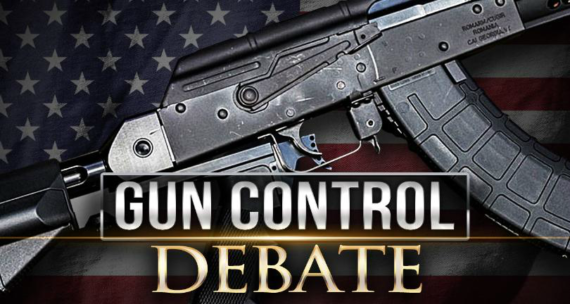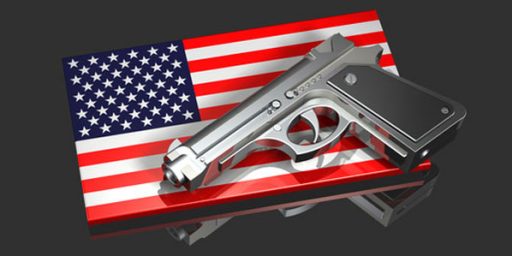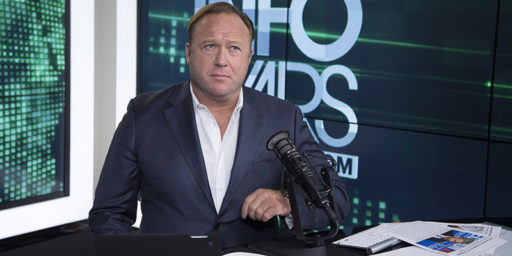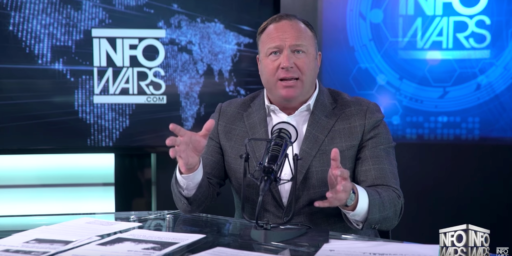Poll Shows Support For Gun Control Slipping Only Two Months After Florida Shooting
Two months after the shooting in Parkland, Florida, support for gun control measures seems to be slipping.
A new poll from Gallup seems to indicate that the increased support for gun control measures that we saw in the wake of the February 14th school shooting in Parkland, Florida is declining even a mere two months after the event:
WASHINGTON, D.C. — Americans’ mentions of guns or gun control as the most important problem facing the nation fell by over half this month, ticking down to 6% from last month’s record high of 13%. Still, gun control continues to be one of the highest-ranked issues named by Americans — only dissatisfaction with government, immigration and race relations were named more frequently.
Additionally, unifying the country and the economy were named as the most important problem by 5% of Americans.
These results come from an April 2-11 poll, nearly two months after the Feb. 14 shooting at Marjory Stoneman Douglas High School in Parkland, Fla.
In the immediate aftermath of this event, public opinion regarding gun control shifted significantly. A March 2-11 Gallup poll found Americans’ support for gun control laws rising to the highest levels since 1993. Meanwhile, the same Gallup poll found a record percentage of Americans mentioning guns as the country’s top problem.
But it remains to be seen how long-lasting these changes in Americans’ attitudes will prove to be. Past shootings, such as the 2012 incident at Sandy Hook Elementary School, have changed at least some aspect of public opinion related to gun control, but these effects have tended to be temporary.
Given this context, the 7-percentage-point drop in the percentage of Americans mentioning guns as the country’s top problem this month might be a signal that concerns over guns in the U.S. are beginning to be fade. But this likely overstates the importance of the indicator’s decline. Mentions of gun control as the country’s top problem remain elevated by historical standards. Since 2001, gun control has been mentioned on average by 1% of Americans as the country’s top problem.
The “most important problem” indicator has not typically behaved in a predictable way after a mass shooting, unlike Gallup questions specifically concerning guns. For instance, support for stricter gun laws often rises after a high-profile shooting and then quickly falls. In the month after the June 2016 Orlando shooting, mentions of gun control as the most important problem edged up four points, only to fall back to the original level over the next two months.
In the month after the December 2012 Sandy Hook incident, mentions of guns as the country’s top problem rose from 0% to 4%. Concerns stayed at this level over the next few months as Congress debated new gun-control legislation; in April, 7% of Americans named guns as the top problem facing the U.S. That same month, a piece of gun control legislation failed a key vote in the U.S., bringing the legislative effort to a close. After this, mentions of guns fell close to 0%.
Concern about guns fell among both Republicans and Democrats this month and at roughly equal levels, suggesting the issue is losing some of its potency with both major parties. Among Republicans, mentions of gun control fell six points this month to 4%; among Democrats, the figure fell eight points to 8%.
To put these numbers in context, the percentage of Americans who mentioned gun control as the “most important” problem facing the country were under 1% prior to the Florida shooting, rose to 13% in a poll taken one month after the shooting, and now stand at 6% in a poll that was taken in the week or so before the two-month anniversary. While that’s a drop of more than 50% in less than a month, it’s worth noting that April’s number is still higher than where they were prior to the shooting. Among self-Democrats, the percentage of people naming gun control as a top priority issue fell from 16% in March to 8% in April, while it fell from 10% to 4% among self-identified Republicans. Among Independents, the number fell from 14% to 5% over the course of one month. This is far enough outside the margin of error to be statistically significant, but still far higher from where the number was prior to February 14, 2018. To that extent at least, it suggests that the issue remains of concern to Americans, but perhaps not at the same level in the immediate aftermath of the shooting and the protests that took place across the country in its wake.
Additionally, it’s worth noting that this type of poll needs to be read carefully. The fact that respondents are not mentioning “guns” or “gun control” as the most important issue facing the country does not mean that they don’t believe that it isn’t an important issue or that it might not have an influence how they vote in upcoming primary elections or in the General Election in November. It’s typically the case that voters walk into the polling place with a number of different issues or events having influenced their decision on who to vote for, after all. Typically issues such as the economy and jobs are at the top of the list while other issues, such as foreign policy, health care reform, and gun control playing a smaller role assuming that exit polling on voting behavior can be trusted as being reliable. Assuming that activists and politicians are successful at keeping gun control issues near the forefront of public attention between now and November, it’s possible that it will continue to be among the mix of “major” issues that voters will consider when deciding who to vote for in November.
At the same time, though, this polling does demonstrate over a very short term period a reality that I have written about before.
In the past, mass shooting events have been shown to have little impact on either gun control policy, the legislative agenda in all but a handful of states, or election, The most recent example of that can be found in what happened after the mass shooting in Las Vegas in October of last year. This was the worst such event in American history, and in the initial aftermath of the attack, polling showed increased numbers in support of certain gun control measures. Despite this, Congress took no action even on issues as seemingly straightforward as banning bump stocks.
We saw something similar after the December 2012 shooting at Sandy Hook Elementary School. Initially, the images that came from that attack of not only the number of victims but the fact that so many of them were children who had not even reached the age of seven years old, led many Americans to tell pollsters that they supported stronger gun control laws. Even in the wake of that horrific attack, though, the polls were indicating that gun control was not a high priority issue even among those who strongly supported such measures. As time passed and the memory of what happened at Sandy Hook and other similar mass shootings faded into memory, the numbers began to fade. Three months after Sandy Hook, for example, polling showed that gun control was slipping as a priority for voters and, within a year after the shooting, support for most gun control measures had fallen off to the levels they were at prior to the shooting. By the second anniversary of the shooting, polling showed that more Americans supported protecting gun rights than passing new gun control measures. One year later, near the third anniversary of the tragedy, polling showed a majority of Americans opposing a ban on the type of weapon used in the Sandy Hook shooting, If history is any guide, this is what is likely to happen this time as well.
This all brings to mind something Kevin Drum that just after the defeat of the Manchin-Toomey bill, which was written in the wake of Sandy Hook and would have expanded the existing background check system to cover more transactions than it currently does. It also happened to be an issue that enjoyed at the time, and continues to enjoy, widespread public support even among Republicans, conservatives, and gun owners:
How did this happen even though, as liberals remind us endlessly, 90 percent of the American public supports background checks? Because about 80 percent of those Americans think it sounds like a reasonable idea but don’t really care much. I doubt that one single senator will suffer at the polls in 2014 for voting against Manchin-Toomey.
Gun control proposals poll decently all the time. But the plain truth is that there are only a small number of people who feel really strongly about it, and they mostly live in urban blue districts already. Outside of that, pro-gun control opinion is about an inch deep. This is a classic case where poll literalism leads you completely astray. Without measuring intensity of feeling, that 90 percent number is meaningless.
I made a similar observation at the time:
Even at the height of the post-Newtown political push, only 6% of Americans considered gun control the most important problem facing the nation. That’s a far cry from the vast majority of voters who say that they support the various gun control measures that have been advocated over the past four months.
This isn’t the first indication that gun control is a low intensity issue among American voters. Back in January, just one month after Newtown, a similar Gallup poll showed the same results that we see in this month’s release. At that time, I predicted that it would be difficult for gun control advocates to get the most ambitious parts of their agenda through even the Senate, but I thought at the time that at least something would be passed. In part, I thought this because it seemed as though the post-Newtown attention paid to the issue was going to make it inevitable and that a low-priority issue like background checks would be something that Congress could pass to make it appear that they’re doing something, even though in reality the Manchin/Toomey bill would have done little to stop the massacres that have garnered much attention over the years. As it turned out, the politics of the issue were far more complicated, and public intensity on the issue of gun control was far less than many thought it might be after the events of Newtown.
Once you understand where the politics of gun control actually stand, the behavior of Republicans and red state Democrats becomes completely understandable.
As I’ve said before in the two months since the Parkland shooting, it’s possible that this time, things will be different. The student activists who have stepped forward in the wake of that event, and the adults who support them, have been far more effective at keeping the issue alive than activists have been in the past. Additionally, the fact that they have events similar to the March 24th nationwide protests planned for later in the year suggests that they might be able to keep this issue in the forefront of voters minds much longer than we’ve seen in the past. Whether it will all have an impact on voting behavior, or, looking further down the line, on the action that politicians take at the local, state, or Federal level, though, is a different matter. Historically that has not been the case, and the fact that poll numbers are showing that voter concern about the issue is declining is not a good sign for their cause, and that means that they’re going to have an uphill battle ahead of them presuming they are going to fight at all.






This is because the Democrats are not campaigning and pushing enough on Gun Control/Safety/Reform/Registration/Confiscation. Democrats need making Abolishing the Second Amendment the central plank in their platform going forward.
Like Beto ‘No one needs a AR-15’ O’rourke who is tied with Ted Cruz in Texas. Progressives and Democrats need to send more resources to Texas and the O’rourke campaign.
Given such numbers, I can’t believe anyone would take seriously the notion there is some organized movement to repeal the 2nd Amendment.
Seriously…
Democrats? Fight? For a policy? Yeah, right.